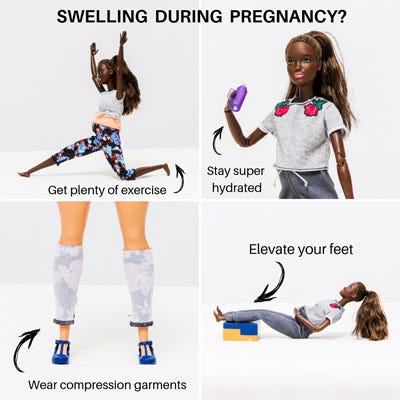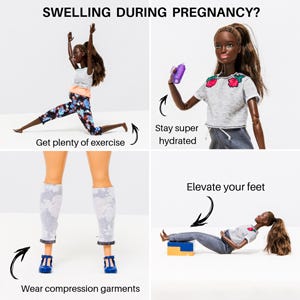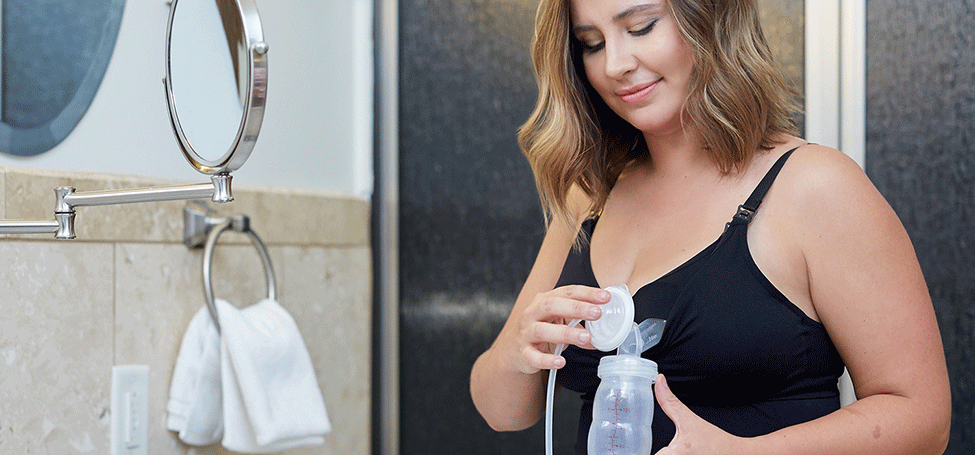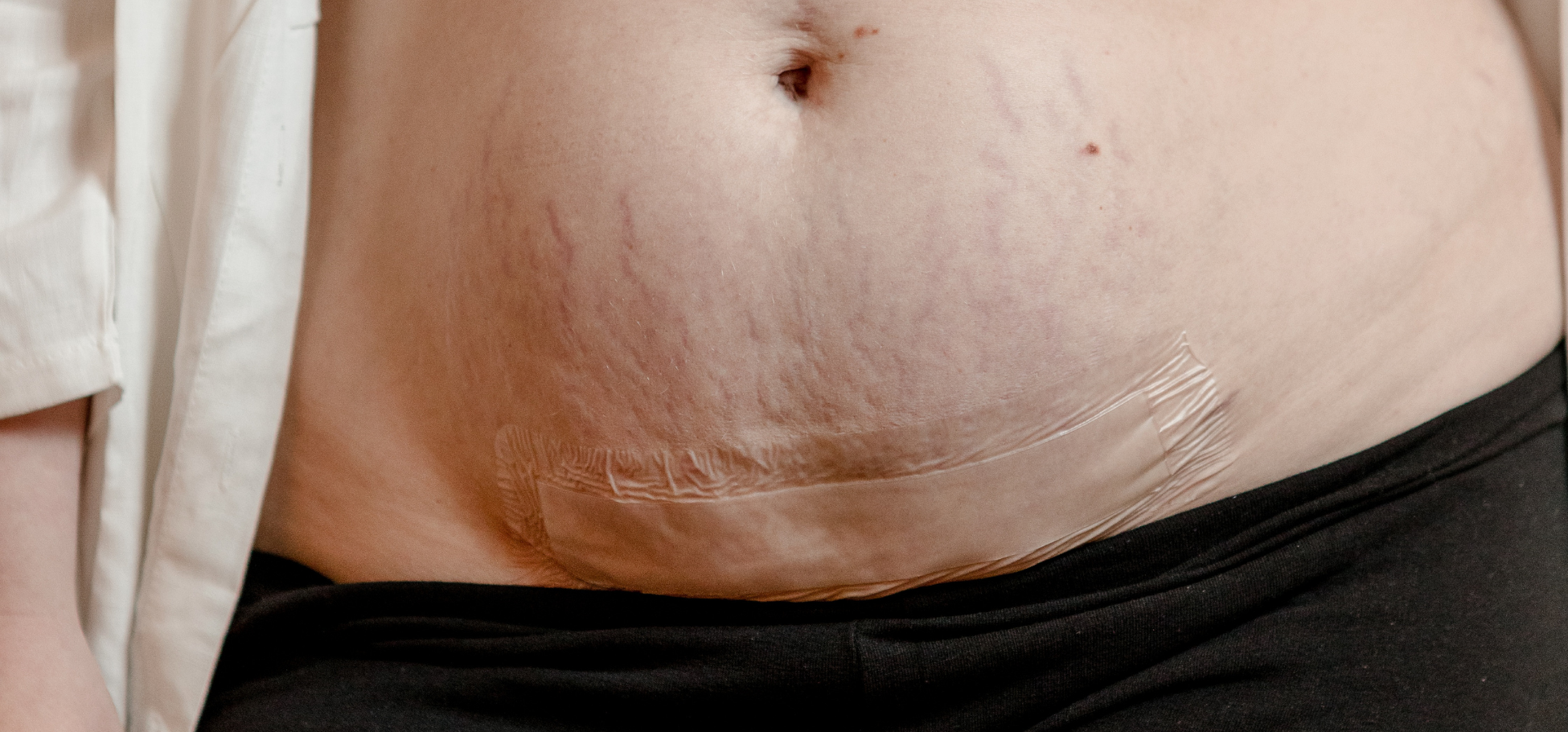During pregnancy, a woman’s body can produce up to 50% more blood volume and body fluids to accommodate the needs of growing a baby! With ALL this extra fluid usually comes a bit of SWELLING (for many)...and with swelling, comes discomfort.
This blood flow to different organs increases during your pregnancy to meet the increased metabolic needs of tissues. AKA: your body is working harder overall during pregnancy, so it needs more blood flow to do its job properly. Blood flow also increases because your body knows you’ll lose some blood during the birth process. In addition, this increase in fluid also helps to lubricate your joints during pregnancy to accommodate for your growing baby!
Types of Swelling You Might Expect
Most moms who do experience normal swelling, experience it in their feet and ankles. This can start anywhere from approximately 3-4 months of pregnancy, all the way up to the 9th month.
Swelling can be uncomfortable or painful for moms, especially as you near your due date.
Swelling is usually the WORST at the end of the day, after you may have been on your feet for a long period of time. And you may notice that when you wake up in the morning, your swelling has gone down. This is due to gravity!
Fluid is heavy, so it has a tendency to collect in the bottom part of your body. When you change positions (such as putting your feet up), you may notice that this helps significantly. Swelling in the lower extremities that comes and goes is generally normal, although if you experience sudden swelling in your feet, ankles, hands, or face that is NOT going away, it’s time to call your doctor. This can be a sign of a life threatening complication called preeclampsia.
Additionally, if you notice that your swelling is in only one side of your body, this is also worrisome and should be brought to the attention of your provider, as it can signify a deep vein thrombosis (a blood clot in your leg).
Tips for Managing the Swelling
If you are experiencing swelling during your pregnancy, there are a few things you can do to combat that fluid!
-
Avoid standing for long periods of time. If you have a job that requires you to stand still all day, ask your employer if it’s possible to reassess your job duties, and change your assignments as needed.
-
If you must stand, take frequent breaks and elevate your feet above your heart until the swelling has started to go down.
-
Exercise! While standing isn’t good, mild to moderate exercise will help keep that blood flowing. Power walking or swimming are two great cardiovascular exercises you can do!
-
Drink lots of water! The more hydrated you stay, the easier it is for that blood to move!
-
Wear comfortable shoes, and wear the right size! You may notice that you need to up your shoe size temporarily during your pregnancy. Additionally, you may need more room all around in your shoes. Avoid wearing shoes that have tight straps, or may pinch your feet.
-
Limit your salt intake. Salt follows water, and if you enjoy a high sodium diet, your swelling may be worse.
-
Limit your time outside if it’s very hot outside. Being pregnant in the summer months as opposed to the winter months has a HUGE effect on the degree of your swelling.
-
Use cold compresses on your feet/ankles at the end of the day. Ice can help decrease your swelling, especially when it becomes painful.
-
Wear compression socks! They may even be covered by your insurance.
Compression Garments and Their Benefits
Along with all of these tips, one of the best ways to combat your swelling during your pregnancy is to invest in good, quality compression garments and wear them frequently! Always check with your provider before wearing compression garments, but most providers give them the green light.
There a few different variations of compression garments, but most women are familiar with the knee-high stockings that feel like really tight socks. These are designed to be extra tight around your ankles, and slowly loosen around your calves higher up. This tightening helps to prevent that pooling that can happen at the end of the day, and it also helps to encourage blood flow to travel back UP your legs. These socks also do a great job of preventing varicose veins if you are prone to them!
Here are a few tips to keep in mind when you are searching for a pair:
-
Most compression socks come in a few different sizes and it’s important to find a pair that fits. Use your shoe size as a guide.
-
Compression garments come in different mmHg, which indicates how pressurized they are. For pregnancy, most providers recommend staying under 30mmHg.
-
Compression garments should be snug, but not tight and uncomfortable. If they are uncomfortable for you, they are likely too tight, and you should exchange for the next size up.
Did you know that socks are not the only compression garment out there for pregnant moms? Many moms enjoy wearing pregnancy support bands (belly bands) during their pregnancies as well. Belly bands are designed to support your lower back and growing belly during pregnancy. These flexible supportive garments provide many benefits to women who are pregnant, especially during the second and third trimesters as baby is growing bigger and bigger!
Along with providing support (which let’s be honest, just feels REALLY GOOD), these bands can also help to decrease round ligament pain, SI joint pain, or sciatica. They also help your posture!
Did you know many of these types of compression garments can be covered by your insurance? Each is uniquely designed to help if you are experiencing specific pregnancy or postpartum-related symptoms. Talk to your doctor if you think they are right for you!

About the Author
Liesel Teen is a Labor & Delivery Nurse and mom of a sweet two-year-old boy. Her work and more helpful advice about pregnancy and birth can be found on her site: https://mommylabornurse.com/.
Information provided in blogs should not be used as a substitute for medical care or consultation.











